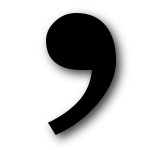Two of less popular and more commonly misused punctuation marks are the colon and the semicolon. Although these punctuation marks are less popular, they are extremely useful! Read the following guidelines to start using the colon and the semicolon correctly.
Colon
The colon has several common conventional uses, yet it has other trickier uses:
1. To separate the hour and the minutes in time.
o 10:23 a.m.
2. To separate the title and the subtitle of some works.
o Fruits and Vegetables: Healthy and Delicious Recipes
o Safety First: A Simple Guide for the Summer Swimmer
3. To introduce a list of items after an independent clause.
o I went to the store and bought several items: lettuce, tomatoes, cheese, bread, and meat.
o There are cities in the United States that I would like to visit: New York, Los Angeles, and Chicago.
4. To introduce an explanation, an example, or a quotation after an independent clause.
o My mother has only one rule at her house: You must be kind to others.
o The mentor offered his student some advice: "Never say never."
Semicolon
The semicolon is used slightly less often than the colon, but it has three simple uses:
1. To join two independent clauses together without using a coordinating conjunction.
o He asked her to marry him; she said "yes".
o Mary wanted to wear red for the family picture; Jack wanted to wear blue.
2. To join two independent clauses together using a conjunctive adverb.
o Jill had been planning an outdoor wedding reception for months; however, the unexpected rain forced her to bring the party indoors.
o All of the students studied hard for the final exam and passed; therefore, they received a party!
3. To separate complicated items in a series that already have commas.
o Nomen Global helps students who want to improve their listening, speaking, reading, writing; who want to experience a new culture; who want to build their vocabulary; and who want to perfect their grammar, pronunciation, and idiomatic usage.
o I have traveled to Paris, France; Beijing, China; Kiev, Ukraine; Melbourne, Australia; and Santiago, Chile.
Hopefully, with practice, you can master both the colon and the semicolon. Study this page and then try this quiz!
To learn more about punctuation, study with us at Nomen Global!
















































